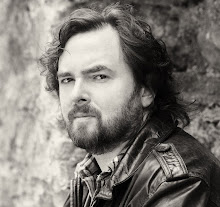
I posted on Twitter this morning about having watched Woody Allen's Vicky Cristina Barcelona last night, and that I hadn't disliked a movie so much in ages. There were a few comments on my Facebook wall in response, so I thought I'd elaborate here, and tie it in to another topic that's been floating around the Interwebs in recent days.
Sometimes a film is poorly made; sometimes it has a turgid script, or bad acting, or uninspiring photography, or any number of faults. I can't say Vicky Cristina Barcelona (henceforth known as VCB) had any such flaws. It was certainly a well-crafted film, as one would expect from Woody Allen. But I used the word 'dislike'. There are many movies that I think are bad, but there are few I actually dislike. Because dislike is personal. Dislike means something in the film actually bothered me. One film I dislike, for instance, is The Devil's Own. I don't dislike The Devil's Own because it's a formulaic and predictable thriller; I dislike it because it displays a shocking ignorance of, and insensitivity to, its own subject matter.
I approached VCB with a positive frame of mind. For one thing, I have visited Barcelona three times, and it is one of my favourite places on earth. For another, I generally have a lot of time for Woody Allen. And yet another, the movie has an excellent cast, and not just in terms of eye candy. Thus, I was hopeful as I inserted the Blu-Ray into my player.
I think the fingernails-on-the-chalkboard feeling began about fifteen minutes in. The problem was this: these characters meant nothing to me. The story, in a nutshell, centres on two young women summering in Barcelona. They are approached and individually seduced by a local artist, and matters are further complicated by his unstable ex-wife. All well and good. But then my inverted snob started to rear his ugly head.
The two young women had no visible means of support. One is studying for a Masters in Catalan culture (as an aside, all the Catalan characters strangely spoke Castilian Spanish, rather than Catalan, which is the dominant language of the region), while the other had just spent many months making a twelve minute film. In other words, they were trust fund kids, living off their fathers' money while arsing about in Europe. In yet other words, they were feckless young adults who had grown up with no idea of the realities of life or the issues that affect most people day to day. While they're mooning around, whinging about the pain of love and desire and commitment, real people are working their guts out and wondering if they can make the next mortgage payment. When the intrusive narrator (and that was one specifically bad part I neglected to mention) tells us how the artist, played by the excellent Javier Bardem, bought his beautiful house with its rambling rooms and gardens from another artist, he neglects to tell us how the artist paid for it. I don't know a single artist who can afford anything other than a normal standard of living, at best, let alone a life of luxury. Then along comes Penelope Cruz, playing a deranged ex-wife whose deep love for the artist drives her to violent rage while she drives us to slap her about the head and shoulders.
So, despite their good fortune in life, these four characters are not a happy bunch. I wish I could afford to be that bloody miserable. While I didn't grow up in poverty, things were tough. I know my mother often went without so that us kids could have basics like shoes or milk money for school. I grew up in a house where a can of Coca Cola was a special occasion luxury. By special occasion, I mean Christmas, or the time I nearly lost my little finger to a school gate, and I got a can of Coke for being brave as the doctors worked on my damaged hand. How can someone like me (not to mention anyone who grew up in real hardship) be expected to feel anything but contempt for a cast of characters who are so vacuous and self-absorbed as those in Vicky Cristina Barcelona? Is there a film genre specifically for those privileged few who have been cushioned from reality all their lives?
As I watched the movie, all the time resisting the urge to just press the Stop button, I couldn't help but think of recent online debates on literary versus genre fiction. There was
the Esquire article, and
Jason Pinter's response, and then
this little gem brought to my attention by Lisa Kenney via Facebook. The argument in that second piece was basically that if the unwashed masses would only give literary fiction a chance, we might have an epiphany and forever leave the intellectual deserts of our crime and romance books, and discover the delightful oases of cerebrally challenging and important works at the higher end of the market.
Bullshit.
There is good and bad in all fiction, whatever the genre. And whatever some might like to think, literary is just another genre, a means of organising the shelves in bookstores. I have read as many works from the literary shelf as any other genre. Some of it was brilliant, some of it was tosh. But here's the problem with literary fiction versus other genres: bad literary fiction is insufferable. I simply can't endure the kind of middle-class navel gazing that bogs down the literary field. Good crime novels are just as capable of shining a light on the human condition as good literary fare. Bad thrillers may be unbelievable, shallow, or even manipulative, but bad literary novels are self-important and pretentious. And worst of all, bad literary novels, and bad art-house movies for that matter, are just plain dull.
Labels: critique, genre fiction, I don't know what I'm talking about, movies




















